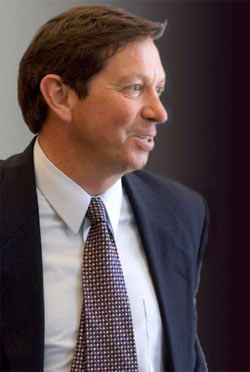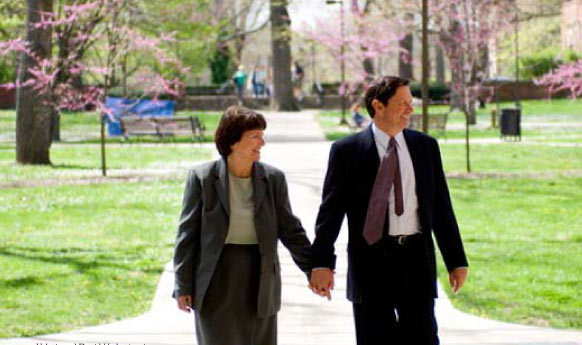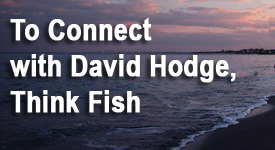
By Nancy Joseph
This summer David Hodge, 57, becomes Miami's 21st president. For three days in April Dr. Hodge and his wife, Valerie, visited all three Ohio campuses to get to know students, faculty, and staff. During these open discussions, filled with hard questions and good humor, Hodge's recurring theme became let's "make Miami more Miami." At the end of the week, Miami's trustees voted unanimously to hire the dean of the University of Washington's College of Arts and Sciences. He succeeds Jim Garland, who is retiring after 10 years as president.
 Take one look around David Hodge's office and his priorities are obvious. You see at least a dozen photographs of his wife and two children. Books about academia and leadership line the shelves. And fish are everywhere. Chocolate fish, wooden fish, plastic fish. Fish magnets. Fish mugs. A fish stapler. Take one look around David Hodge's office and his priorities are obvious. You see at least a dozen photographs of his wife and two children. Books about academia and leadership line the shelves. And fish are everywhere. Chocolate fish, wooden fish, plastic fish. Fish magnets. Fish mugs. A fish stapler.
Hodge's love of fishing, which he describes as "bordering on an obsession," led to the purchase of a family cabin near exceptional fishing in eastern Washington six years ago. Now his other passion, higher education, has led him to Oxford to guide Miami University as its 21st president.
He comes from the University of Washington (UW) in Seattle, where he has spent 31 years as a professor of geography, a department chair, a divisional dean, and most recently dean of the College of Arts and Sciences - by far the largest college at the UW.
After more than three decades at a university he calls "fantastic," why pack up for Ohio?
The timing is right. More important, the place is right.
"Miami University is an uncommonly good fit," explains Hodge, who visited the campus several times before making his decision. "It is a great school with a great history. And I really like the values of the people I've met here. There's a sense of Midwest culture, a lot of common sense and straight talk that I understand and admire. When you combine that culture with excellence, you get something really special."

From the Midwest, he was born in Stewartville, Minn., and grew up in Austin, Minn., the oldest of six children. His father worked as a truck driver, and his mother was a homemaker. His childhood memories are overwhelmingly positive, particularly of the summers he spent on his aunt and uncle's farm nearby.

Until high school, Hodge thought he would follow in his uncle's footsteps and become a farmer. But when he signed up for agriculture in ninth grade, the assistant principal suggested to his parents that he pursue a more traditional, academically challenging curriculum.
That conversation proved to be a turning point. He became more academically focused and went on to Macalester College in St. Paul - at 100 miles away, the farthest he'd been from home.
The first in his family to attend college, he majored in geography and excelled in sports, becoming an All-American in track and ranking second nationally in his division. Unfortunately, that didn't count for much at the meatpacking plant where he worked two summers scraping hair roots out of pork bellies.
"Not exactly what you'd envision for a future university president," he says, laughing. "But it was a good job and a really interesting experience."
 He graduated from Macalester in 1970 (later serving on its alumni board and board of trustees) and earned a doctorate in geography from Pennsylvania State University in 1975. After a one-year appointment at McMaster University in Ontario, he arrived at the University of Washington as an assistant professor of geography in 1975. He graduated from Macalester in 1970 (later serving on its alumni board and board of trustees) and earned a doctorate in geography from Pennsylvania State University in 1975. After a one-year appointment at McMaster University in Ontario, he arrived at the University of Washington as an assistant professor of geography in 1975.
His wife, Valerie, chose a similar path. An Idaho native, she also attended Macalester College as a geography major - six years after Hodge - and later enrolled in graduate school at the UW. That's where she and David met. For the past 11 years, Valerie has been director of institutional research at Bellevue Community College.

While a UW professor, David Hodge discovered a talent for both teaching and research. His teaching earned him numerous awards; his research led him to serve as a consultant to local and state agencies, as a program director at the National Science Foundation, as editor of a core journal in his discipline, and as supervisor to more than 40 graduate students.
In 1990 he won the UW's Distinguished Teaching Award, which he still considers a career highlight. His teaching style? "Demanding yet engaging," he says.
A student nominating him for the award supports Hodge's self-assessment. "I wouldn't have missed this course for anything in the world," the student wrote, "and nothing in the world would ever make me take it again."
Great teaching requires passion, organization, and empathy, Hodge believes.
"You need to be able to put yourself in your students' position and imagine their motivations. That's also why a lot of talented teachers make good administrators. They're trying to see something from the other person's point of view, whether it be a faculty member, student, or alum. As an administrator, that skill is critical."
He should know. As dean of the UW's largest college for the past eight years, he has grappled with complex issues ranging from curriculum reform and budget cuts to diversity, all the while interacting with faculty, staff, students, alumni, donors, and business leaders, among others. His approach: think strategically, raise difficult questions, and bring together great minds to tackle them.

"What I've really enjoyed about working with David is how he includes other people in problem solving," says Julie Stein, a UW professor of anthropology, director of the Burke Museum of History and Culture, and a divisional dean for six years.
"He is completely open with people telling him an idea is crazy or won't work. Everyone feels free to offer suggestions, however brilliant or ridiculous. Nothing is ever done alone. He comes up with solutions by using more than one brain."
It helps, adds Stein, that Hodge's enthusiasm is infectious. "I've seen David talk to senators, football coaches … there's nobody he can't connect with. He approaches his job with an almost religious zeal. And he doesn't do anything he doesn't believe in. He can't fake it."

While his love of the UW and Seattle is unfaltering, his passion for higher education and its possibilities is even greater. And he sees Miami as the institution most poised to define the future of public education. He came to that conclusion after visiting Oxford and speaking with many people on and off campus. That's also when he realized that this position at this university was the right one for him.
"The first thing I hear when I talk to Miami alumni is how involved and caring the faculty are," Hodge says. "The connection the students feel to the faculty is extraordinary. That is a tremendous asset, and it was a huge factor in my decision to accept the position."
 David Hodge is thrilled to be living in Ohio. But he has one pressing question. Where are the fish? David Hodge is thrilled to be living in Ohio. But he has one pressing question. Where are the fish?
Fishing, for Hodge, is both recreation and therapy. He started with his father in Minnesota and honed his technique on the waters of Washington.
"Fishing provides balance in my life. It's my form of renewal, my way of refocusing my energy. The joy of fishing is indescribable. Either you know it or you don't."
He particularly enjoys going after bass and trout and insists he can "catch fish in a mud puddle - or at least I can try."
David and Valerie Hodge plan to keep their cabin in eastern Washington, where the fishing is superb, but visits there will be infrequent. So tips on Ohio fishing holes will earn big points.
"I know there are a couple of lakes nearby, particularly for top-water bass fishing," Hodge says, "but I'd love to get more advice on where to fish. And it would be great to share a day on the water now and then." |
Although the title of "president" is new for Hodge, the leadership role is not. "I've been dean of a college that has more students than all of Miami University. I've been one of a handful of senior administrators at a university that is tremendously complicated, and I've had a lot of autonomy. That's given me a wide array of opportunities and experiences to draw upon. I've never looked at my job as one of managing. It's about leading, transforming, finding new resources. All of that I will bring to Miami."
He also brings a successful track record in fundraising. Gregarious by nature, he relishes contact with alumni and the community. Under his leadership, the UW College of Arts and Sciences set an audacious goal eight years ago to increase its number of faculty endowment positions from 18 to 100. The college met the goal last summer.
Of course, Hodge has a secret weapon: Valerie.
"As an academic herself, she's immersed in this stuff. She thinks about higher-education issues all the time. And like me, she likes connecting with people, both inside and outside the university."
The couple is eager to settle into Lewis Place with their calico cat, Nala. (They'll live in the Lottie Moon House a block away while Lewis Place undergoes long-planned renovations.) Their daughter, Meriem, is coming with them and will complete her last two years of college at Miami. Their son, Gene, who graduated from the University of Washington in June, will remain in Seattle.
"This is a challenge that David and I both want to take on," Valerie says. "And Oxford is just beautiful. The campus is exquisite. That's the only word for it."
David Hodge views this as the final chapter in his professional career, although career isn't the word he'd choose.
"This is not a job, it is a way of life. It's about making Miami University truly the center of our lives and our home. Valerie and I wouldn't leave a place as wonderful as the University of Washington after 31 years unless we believed that what's next will be even better for us. This new chapter seems incredibly special. We can't wait for it to begin."
Nancy Joseph is director of publications for the College of Arts and Sciences at the University of Washington.
 Back to the Miamian Magazine Summer 2006 Web page Back to the Miamian Magazine Summer 2006 Web page
|

 Take one look around David Hodge's office and his priorities are obvious. You see at least a dozen photographs of his wife and two children. Books about academia and leadership line the shelves. And fish are everywhere. Chocolate fish, wooden fish, plastic fish. Fish magnets. Fish mugs. A fish stapler.
Take one look around David Hodge's office and his priorities are obvious. You see at least a dozen photographs of his wife and two children. Books about academia and leadership line the shelves. And fish are everywhere. Chocolate fish, wooden fish, plastic fish. Fish magnets. Fish mugs. A fish stapler.
 He graduated from Macalester in 1970 (later serving on its alumni board and board of trustees) and earned a doctorate in geography from Pennsylvania State University in 1975. After a one-year appointment at McMaster University in Ontario, he arrived at the University of Washington as an assistant professor of geography in 1975.
He graduated from Macalester in 1970 (later serving on its alumni board and board of trustees) and earned a doctorate in geography from Pennsylvania State University in 1975. After a one-year appointment at McMaster University in Ontario, he arrived at the University of Washington as an assistant professor of geography in 1975.
 David Hodge is thrilled to be living in Ohio. But he has one pressing question. Where are the fish?
David Hodge is thrilled to be living in Ohio. But he has one pressing question. Where are the fish?